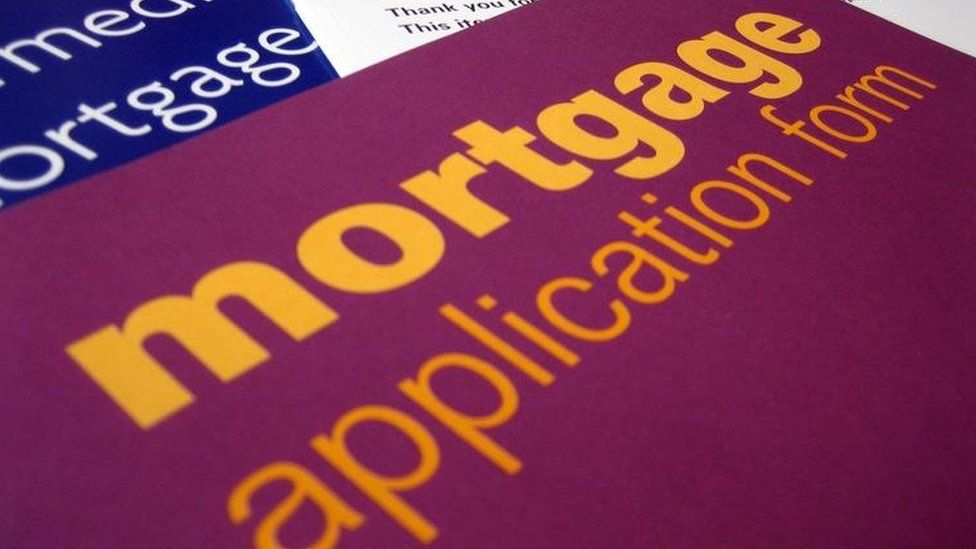Mortgages: Nearly one million 'face difficulties'
- Published
- comments

Nearly a million homeowners have no way of paying off their mortgages because they opted for interest-only loans, according to Citizens Advice.
The new figure is much higher than previous estimates from lenders and from the City watchdog, the Financial Conduct Authority (FCA).
Citizens Advice said 934,000 owners did not have a plan for how to pay back the money at the end of the mortgage term.
It warned that time was running out for some to organise their finances.
They faced having to sell their homes or even have the property repossessed if they were unable to find other funds, the charity said.
Head of Mortgage Policy at the Building Societies Association Paul Broadhead examines what the options are
'Silly'
Millions of buyers were sold interest-only mortgages before rules were tightened up three years ago.
Without the need to pay back some of the loan each month on top of the interest, they could borrow more to buy their dream homes.
Sarah, who lives near Brighton and has an interest-only mortgage, said she and her husband could hardly afford the interest when they bought their house and frequently fell into arrears.
"We were silly. We'd just had our first baby," she said.
"But they shouldn't have given the loan. We didn't understand what we were taking on and didn't think about having to pay it back."
They have 16 years until they have to return nearly £200,000, but admit the debt has become a constant worry.
What is being done
Banks and building societies have been told by regulators to write to their customers to warn them that they could be in financial danger.
In some cases they have converted interest-only mortgages into Lifetime Mortgages, which allow borrowers to stay in their homes though retirement, paying interest if they can.
The debt is paid off when they die or have to move out.
'Financial black hole'
Citizens Advice has estimated that out of the 934,000 who have no plan in place to repay the loans, more than 432,000 have not even thought about the issue.
"People buy a home for stability, but interest-only mortgages have forced many into a financial black hole," says the charity's chief executive, Gillian Guy.
Two years ago the FCA calculated that a far smaller number, around 260,000, had no strategy to pay off their mortgages.
Part of the explanation could lie in different estimates of the number of interest-only loans.
The FCA put it at 2.6 million, a figure which the Council of Mortgage Lenders (CML) believes has fallen recently to 2.4 million.
But Citizens Advice has arrived at a total of 3.3 million borrowers, by taking into account the fact that many couples have joint mortgages.
And it argued that its polling had produced a more accurate picture of the proportion who have little prospect of dealing with the debt.
Endowments
The first sizeable wave of repayment problems is expected to appear in 2017-18, when endowment mortgages sold in the 1990s reach their peak period of maturing.
A decade later, in 2027-28, the surge in interest-only mortgages taken out from the early 2000s reaches a high point.
And the final peak comes in 2032 when the wild lending to people who could barely afford the interest, just before the credit crunch, has to be dealt with.
Citizens Advice wants mortgage providers to do more, including phoning people and offering face-to-face meetings, to help them prepare for the day when the demand for repayment arrives.
It also wants greater protection for interest-only borrowers, to force the lenders to consider a range of alternatives before trying to repossess a home.
The CML, which represents mortgage lenders, said: "Lenders will continue to communicate directly with customers in a variety of ways and to raise consumer awareness.
"Borrowers should not ignore attempts to communicate with them. The lender is trying to help and reduce the risk of shocks at the end of the mortgage term."
A spokesman for the FCA said: "We expect firms dealing with interest-only borrowers to discuss repayment strategies and propose solutions where there are no plans in place.
"While we have seen many firms progress with this, borrowers must also engage with their lenders now to resolve it, we will also continue to monitor lenders as part of our normal supervisory work."
